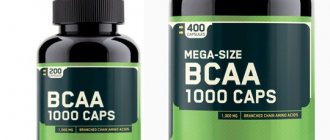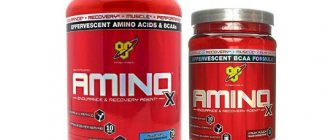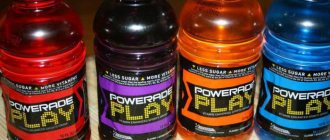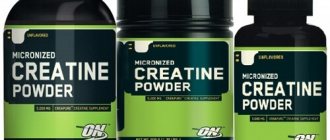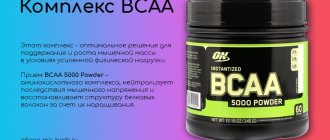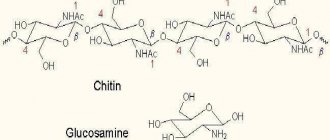Share:
BCAA is a dietary supplement containing amino acids. These compounds are not produced naturally; they enter the body only with protein foods.
Recently, experts are increasingly talking about the low effectiveness of individual amino acid intake. They support their point of view by the fact that eating a piece of high-quality steak is much cheaper and healthier, and there is even more protein. The only difference is that in this case the amino acids will enter the body a few minutes later than when taking BCAA. Let's find out if this is really true, what are the benefits, advantages and possible harm of BCAA.
What are BCAA
First, let's explain what amino acids are as substances. The muscle tissue of the human body consists of proteins, for the construction of which amino acids are needed. That is, these microelements are the basic building blocks of muscles. All amino acids are divided into non-essential (produced in the body) and essential (obtained only with high-quality nutrition).
BCAA is not one amino acid, but a whole complex consisting of three components: leucine, isoleucine and valine. These organic compounds are considered essential.
What are BCAA's for?
Let us analyze the significance of each amino acid from the complex in more detail:
- Leucine (daily requirement 8 to 15 g). Main functions in the body: building new muscle fibers, reducing blood glucose, preventing severe fatigue, protecting muscle tissue from catabolism (breakdown), an additional source of energy, strengthening the immune system, rapid healing of damaged tissues;
- Isoleucine (daily requirement 3 to 6 g). Main functions in the body: maintaining normal blood sugar levels and stabilizing blood pressure, increasing the performance of muscle fibers, stimulating protein production, improving mood, rapid restoration of damaged tissues;
- Valine (daily requirement 2 to 6 g). Main functions in the body: maintaining normal brain function, reducing excessive appetite, helping to restore and build new muscle fibers, stimulating the production of hormones that improve mood and well-being.
As you can see, BCAA supplementation has many beneficial properties necessary for athletes of any intense discipline. Moreover, scientists have proven that leucine, valine and isoleucine make up 35% of all amino acids found in skeletal muscles. This means that the complex of amino acids in question must be supplied with food.
Production technology
The name of the supplement is deciphered and translated into Russian as “branched-chain amino acids.” On various sites dedicated to bodybuilding and sports nutrition, you can find the opinion that these essential amino acids are produced from dairy or animal raw materials. In fact, this is not true; BCAA's are made from plant proteins.
The essence of the technology is the chemical or enzymatic isolation of leucine, valine and isoleucine. After processing, the semi-finished product is cleaned of impurities and brought to a powdery state. If this additive were made from milk or meat, its cost would greatly exceed the purchasing power of most consumers. That is why all companies use cheap plant proteins as raw materials.
How to check the quality of BCAAs
In the conditions of fierce competition in the sports nutrition market, many manufacturers or distributors deliberately underestimate the quality of products in order to reduce production costs and increase profits.
The ideal option is to choose a product from a well-established foreign brand. Even if it costs 10-15% more than its domestic counterpart, you will know that you spent your money on an honest product, unless you run into a fake. Unfortunately, the quality of many domestic manufacturers is poor. They use low-quality raw materials, the products contain foreign impurities, and the composition and energy value do not correspond to those stated on the packaging.
High-quality BCAAs should have the following characteristics:
- slightly bitter aftertaste;
- when dissolved, a small white sediment remains at the bottom of the shaker;
- the consistency of BCAAs is a crushed powder, something between flour and powdered sugar;
Also pay attention to the label and the seal of the jar. If you see that the label is stuck crookedly or not completely, or you notice that the seal of the jar is broken, do not buy this product. There is a 99% chance that you are holding a low quality fake in your hands. The label must also contain a mark indicating compliance with the GMP quality standard.
Difference between BCAA and other amino acids
Many novice athletes do not know what is better to buy - BCAA or a simple amino acid complex. Let's figure it out.
Features of BCAA
So, we already know that its constituent components - leucine, valine, isoleucine - contribute to high-quality muscle recovery.
This effect is explained by the fact that these three amino acids very quickly enter the muscle fibers and there they begin to synthesize new cells, thereby healing damaged tissue and increasing muscle mass.
The principle of action of other amino acids
In turn, simple amino acid complexes, which usually include BCAA (in small quantities) and several other amino acids, enter the liver after intake. There they are absorbed and gradually distributed throughout the body, restoring both energy reserves and all damaged tissues. As a result, muscle fibers still receive the necessary components for regeneration, but this happens much more slowly than when taking only leucine, valine, and isoleucine.
What do we choose?
The speed of absorption is the main difference between BCAA and simple amino acid complexes. Okay, but what should a novice bodybuilder choose? If financial capabilities allow, you should purchase both supplements:
- Taking simple amino acids is perfect as a snack when you can’t eat a full meal.
- A portion of BCAA will be useful during training and immediately after exercise, which will avoid catabolism (destruction of muscle fibers).
Norms and time of consumption
If you decide to add branched chain amino acids to your diet, the amount you should take depends on your activity and your goals.
The World Health Organization recommends that the average adult should consume 34 milligrams of BCAA per kilogram of body weight daily.
But more recent research suggests that the amount required may be up to 144 mg per kilogram of body weight per day. If these new results are to be believed, it turns out that adults need to consume:
- Women: minimum 9 grams of BCAA per day;
- Men: minimum 12 grams per day;
- People who consume enough protein in their diet likely do not need supplements.
However, daily requirements may be higher for athletes, people doing strenuous exercise, or for busy people who, due to their profession, sometimes simply do not have time to get the required portion of protein before going to the gym. For them, supplements can be very helpful.
Most of the studies that found beneficial effects used doses of 10 to 20 grams of BCAA per day.
Supplements are available in powder, capsule, tablet and liquid form. The powder dissolves well in water, but many recommend mixing it with juice. Powder is cheaper and therefore more popular. The number of capsules depends on the dosage.
Approximately 37 mg of amino acids are required per 1 kg of body weight. Multiply 37 mg by your weight and divide the result by the manufacturer's recommended capsule dose, such as 500 mg. Then if you weigh 80 kg you need 6 capsules. Some people find it difficult to take 6 capsules at once and another 6 capsules after training, which explains the popularity of powdered BCAA. For an 80 kg athlete, you need 5 g of powder during training and 5 g after it. In liquid form, amino acids are taken 40 ml before and after training.
It is better to take BCAA before or immediately after your workout. Many people trying to gain muscle mass also take them in the morning and before bed.
Getting 5-12 grams of BCAAs daily is an adequate amount for many people. This amount can be obtained through a healthy diet. Athletes may benefit from supplementing with 10-20 grams of BCAA per day.
BCAA in regular foods
We offer a table of BCAA content in products popular with bodybuilders. The calculation is presented per 100 g. Please note that we selected not only proteins, but also carbohydrates. This will help you create a complete diet that covers the body's needs for leucine, valine and isoleucine.
| Products | Protein content (g) | Leucine (g) | Valin (g) | Isoleucine (g) |
| Veal | 20 | 1,6 | 1,2 | 1 |
| Pork | 14,5 | 1,1 | 0,8 | 0,7 |
| Chicken | 21 | 1,8 | 0,9 | 0,8 |
| Chicken egg | 13 | 1 | 0,9 | 0,7 |
| Turkey | 22 | 1,8 | 1 | 1 |
| Beef | 20 | 1,7 | 1,2 | 1 |
| Cod | 16 | 1,3 | 0,9 | 1,5 |
| Herring | 20 | 1,6 | 1 | 0,9 |
| Pollock | 16 | 1,3 | 0,9 | 1,1 |
| Perch | 17 | 1,6 | 1 | 1,1 |
| Squid | 17 | 2 | 0,5 | 0,4 |
| Milk | 3,2 | 0,3 | 0,2 | 0,2 |
| Kefir | 3,5 | 0,3 | 0,2 | 0,2 |
| Cottage cheese | 3,7 | 1 | 0,7 | 0,6 |
| Hard cheese | 20 | 1,6 | 1,6 | 1,3 |
| Buckwheat | 12,5 | 0,7 | 0,6 | 0,5 |
| Oatmeal | 12 | 0,8 | 0,6 | 0,5 |
| Rice | 7 | 0,6 | 0,4 | 0,3 |
| Pasta | 11,5 | 0,7 | 0,2 | 0,4 |
| Rye bread | 5 | 0,5 | 0,3 | 0,2 |
| Peas | 23 | 1,2 | 1 | 1,3 |
| Beans | 22 | 1,7 | 1,1 | 1 |
Which BCAAs to choose
Every self-respecting sports nutrition manufacturer presents BCAAs in their product line. However, for one reason or another, some products almost never reach the market, while others, on the contrary, are in great demand. Based on the ratings of the largest online sports nutrition store, we have identified the most popular BCAAs in the fitness environment.
Among them:
- Xtend BCAA from SciVation. The main advantage of this product is the variety of flavors. Orange, blueberry, fruit punch, grapes, green apple, lemon-lime, mango, pineapple, strawberry-kiwi, strawberry-mango, watermelon - as you can see, there are BCAAs for every taste. Each serving contains 7 g of BCAA in a 2:1:1 ratio and 0 calories. Additionally, the product contains a mixture of electrolytes that will help maintain water-salt balance during training.
- AMINOx from BSN. This product has one interesting feature - it begins to foam after mixing. It turns out something like lemonade, only dietary and healthy. Some people like it, some not so much. Citrulline is added to the composition, which improves blood circulation in the muscles. The only negative is the large number of dyes.
- BCAA 5000 Powder from Optimum Nutrition. These are one of the few powdered BCAAs that come without flavoring. Yes, the product has a specific taste, but you know for sure that you bought the three amino acids you need and nothing more. You can find variations in flavors: fruit punch and orange.
Of course, the list doesn't end there. There are many manufacturers that produce high-quality products, but their BCAAs have not yet achieved such popularity in the market.
We also recommend that you pay attention to our BCAA rating – an overview of the most popular brands.
How do athletes use BCAA?
Branched-chain amino acids have been proven to be beneficial for representatives of almost any sports discipline. Let's take a closer look at how the benefits of the complex can be used in different types of training.
Preservation and maintenance of muscle mass
This BCAA property is useful in bodybuilding, powerlifting, crossfit, and fitness. Let's turn to physiology. Muscle tissue runs on ATP, a specific compound that is a universal source of energy. But ATP reserves run out very quickly, literally within a few seconds after the skeletal muscles begin to work. Therefore, in order to continue intensive training, the body needs to synthesize (create) new ATP molecules.
The process of synthesis and replenishment of energy reserves occurs in several ways, one of which is the gradual breakdown of muscle fibers in order to obtain BCAA amino acids and their subsequent processing into ATP.
Conclusion: additional intake of the supplement will help preserve muscles from breakdown and increase the intensity of strength training.
Reduction of fat layer
This property of the amino acid complex is indispensable in aerobics, light fitness, shaping and other aerobic disciplines intended for weight loss. Let us immediately note that the range of functions of proteins is very wide. Protein foods, broken down by the body into amino acids, are involved in many biochemical reactions, including the reactions of burning subcutaneous fat.
Therefore, if an athlete does not meet the required protein intake from foods, he should additionally take amino acid complexes. And since muscle fibers consist of one third of leucine, valine, and isoleucine, it is the BCAA supplement that is preferable when exercising for weight loss.
In addition, branched chain amino acids help produce growth hormone, which is responsible for burning fat deposits. That's what BCAA is for.
Reduced fatigue
This property of the supplement has a positive effect on any type of speed training where high endurance is required (athletics, crossfit, interval running, work on cardio equipment, HIIT, Tabata). And again we will have to turn to the biochemical processes in the body. So, muscle tissue consists of more than 20 amino acids. Some of them are directly dependent on each other. For example, there is a connection between the amino acid tryptophan and the BCAA complex.
One of the properties of tryptophan is the production of serotonin, a substance responsible for fatigue, relaxation of the body and falling asleep. The lower the BCAA level, the higher the amount of tryptophan in the blood and the faster the athlete gets tired during training.
Conclusion: additional supplementation reduces the total amount of tryptophan, which allows the athlete to train longer.
Positive effect
The positive effects of BCAA are well studied and proven by research. When the body lacks amino acids, muscle growth stops. For a person leading a measured lifestyle, there are enough substances. But for athletes, especially representatives of strength sports, they are not enough.
With intense physical activity, the concentration of free essential amino acids in the body decreases (especially leucine). To make up for the deficiency, metabolic processes are activated that destroy muscle proteins. This does not happen when taking sports nutrition.
BCAA supplement is a source of energy. The chemical reaction of leucine produces more ATP than the same volume of glucose. BCAA cover the excessive consumption of glutamine during sports activities. This element plays an important role in gaining muscle mass, controls protein synthesis, and increases the concentration of growth hormone.
BCAA not only helps build muscle, but also promotes weight loss. The supplement normalizes leptin synthesis. This is an element that regulates appetite, consumption and accumulation of fat.
Leucine saturates the body with nutrients, which dulls the feeling of hunger. Regular exercise burns calories and fat - a person loses weight.
The benefits and harms of BCAA for female and male bodies
The main beneficial properties of leucine, valine, and isoleucine for men are, of course, the preservation of muscle mass and recovery after strength training. Let's not forget about stimulating the hormonal system. BCAA helps build muscle volume, which is accompanied by increased production of testosterone and somatotropin. These hormones, among other things, are responsible for motivation, good mood, burning subcutaneous fat, and also help maintain libido at a high level.
Leucine, valine and isoleucine are also useful for girls:
- Firstly, these amino acids are involved in the formation of female sex hormones, which are responsible for mood and the normal functioning of many internal systems of the body.
- Secondly, BCAAs reduce appetite and help reduce body fat.
- Thirdly, a regular supply of essential branched chain amino acids helps maintain healthy skin, hair, and nails.
It is worth saying a few words about the “harm” of BCAA. In fact, this myth has long been “walking” among inexperienced athletes. For example, you can often hear that protein and amino acids are chemistry. Most often, this opinion is associated with ignorance of the functions and composition of sports nutrition.
Scientists have long proven the harmlessness of protein supplements for human health (including the amino acids in question). Therefore, all athletes, regardless of gender, are recommended to take additional sports nutrition.
How much and when should I take?
In terms of quantity, one serving before your workout can do wonders. But this does not mean that you cannot take them at any other time, but in order to absorb them, at least 2 servings are recommended, especially for athletic girls.
If your body is sensitive to dehydration, then the best time to consume BCAA is in the morning, as a girl's body goes without water for at least eight hours while sleeping!
Therefore, in the morning you can drink one serving with water. It is also very useful for morning workouts.
Honestly, there is no right answer here. If you work out more than once a day, treat yourself to a serving between workouts.
On days when you are not training, you can consume BCAA after waking up. They stimulate muscle recovery and protect them from destruction after a nightly burst of catabolism.
Do ordinary people who do not play sports need BCAA?
It all depends on the quality of a person's diet. Many people follow special diets. This happens for various reasons: some have to limit their menu due to medical contraindications, some are adherents of different spiritual views (for example, vegetarians), while others are too lazy to visit the fitness room and try to lose excess weight. by eliminating many foods or reducing calorie intake.
In any case, a reduction in diet is accompanied by a lack of certain microelements. And if these are protein compounds, then additional intake of sports supplements (protein, BCAA, simple amino acid complexes) will help maintain the normal functioning of the body during periods of forced restrictions.
It is worth noting that BCAA amino acids and protein alone are ineffective for increasing muscle size. In order for muscles to grow, it is necessary to engage in strength training.
The fact is that an athlete, performing heavy exercises with weights, “injures” muscle fibers. Between workouts, during sleep, the resulting micro-tears are overgrown with new tissue. Protein and amino acids are exactly what the body needs to create muscle cells at the site of injury. This is exactly how a gradual increase in body weight occurs. If you take sports nutrition without going to the gym, there will be no positive effect. The maximum that can be obtained in such a situation is indigestion and loss of money.
BCAA powder
Powdered BCAA is the most common form of release of these amino acids. Many brands make a really high-quality and tasty product that is pleasant to drink during and after training.
The main selection criterion is taste: for many manufacturers it is too reminiscent of chemical components, for others it is almost identical to natural ones. But it is not at all necessary that “tasteless” BCAAs will be poor in composition and quality.
For many companies, BCAAs in powder become a kind of calling card; it is by them that the consumer judges whether the products of this brand are suitable for him or not. Further sales and profits directly depend on this. This is why it is so important for new brands to make delicious BCAAs that everyone will love. Manufacturers who already have a name, an extensive customer base and trust from the buyer no longer need to make additives that taste ideal - the main thing is to maintain the quality and effectiveness of the main components.
The following powdered BCAAs are in greatest demand on the market:
- Xtend BCAA from SciVation. In addition to taste, the product is notable for the presence of glutamine in its composition. This amino acid is used in many BCAAs. Glutamine is a powerful support for the immune system; its use reduces the risk of colds in autumn and winter.
- AMINOx from BSN. Despite the pleasant taste and balanced amino acid composition, many do not like this product due to the presence of sucralose in it. According to unconfirmed data, this sweetener causes allergic reactions, reduces immunity and contributes to diseases of the gastrointestinal tract. However, there have been no official complaints from AMINOx buyers in this regard.
- Intra Fuel from SAN. In addition to amino acids, this product contains potassium, calcium, niacin, vitamin B6 and phosphorus - micronutrients necessary for active life and immunity. It also contains arginine and beta-alanine - components that enhance physical performance. Despite the product's advantages, not all consumers like its sharp orange taste.
